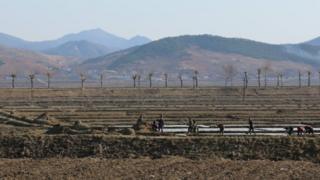Bad harvest leads to N Korea rations cut
Millions of North Koreans are being forced to rely on meagre rations after the nation’s worst harvest in a decade.
The country is 1.36m tonnes of food short following a series of weather disasters, compounded by longstanding international sanctions.
A UN assessment found North Koreans had been surviving on just 300g (10.5 oz) of food a day so far this year.
In previous years rations have been cut so low only during the “lean season” – the last few months before harvest.
About 70% of the North Korean population rely on food rations, according to UN figures. They have fallen from 550g in early January to 300g per person. There are fears they could be cut further before the next harvest, which is still six months away.
“It used to be they only reached this low level in July, August, and September,” said Mario Zappacosta, a senior economist at the UN’s Food and Agriculture Organisation (FAO), who visited North Korea last month.
“If the international community does not take action somehow, and quickly, there are some social groups who will suffer – the kids, the pregnant women, lactating mothers,” he said.
‘Low rains, a heatwave. Then floods’
North Korea has struggled for decades with food production. The nation suffered a famine in the 1990s which is thought to have killed hundreds of thousands. Today, some 770,000 malnourished women and children are being fed in part by the UN’s World Food Programme (WFP).
The WFP estimates that 10.1 million people are now suffering from severe food shortages, following the worst harvest since 2008/09. “This year they have had a real series of weather shocks – they had everything,” Mr Zappacosta told the BBC. “Low rains, then a heat wave, then floods.”
The weather extremes were followed by a lower than usual amount of snow, which would usually cover the ground and protect the “early harvest” – including wheat, barley and potato crops.
The deficit was made worse by a lack of fuel and spare parts, which are in short supply due to economic sanctions. That meant some of the food which did survive last year’s weather shocks was left in fields for weeks – where it became fodder for rats and other vermin.
While it appears that North Korean officials were aware of the scale of the problem at the start of the year, it was only open about it with the UN in March, when North Korean officials invited a team from the WFP and Food Agriculture Organisation to make an assessment of the situation.
The delegation visited in April 2019 and found the production of the early harvest alone to be down by about 20% on last year.
They also found families surviving “on a monotonous diet of rice and kimchi most of the year, eating very little protein”, according to a report by the WFP. The report said some families were eating protein only a few times a year.
Source: Read Full Article



